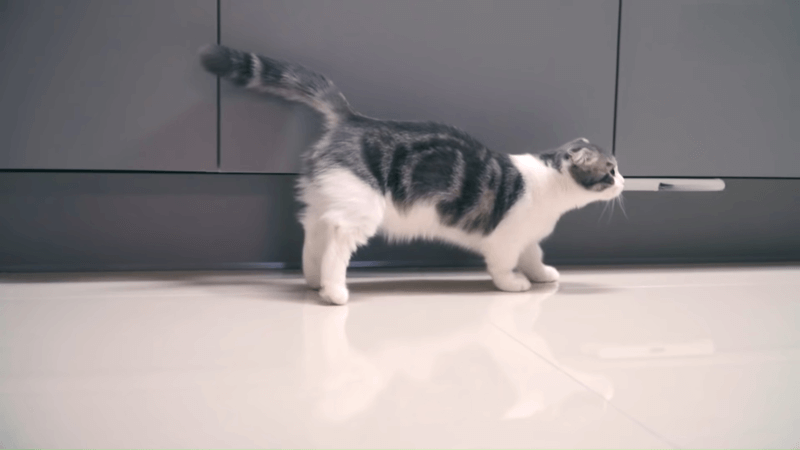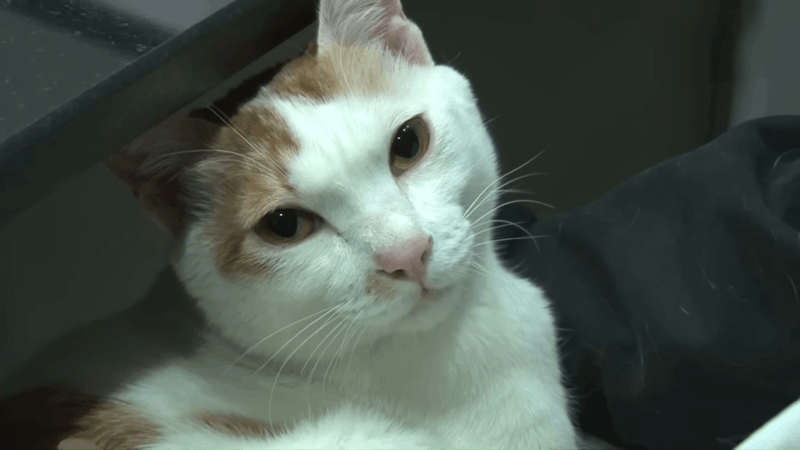No products in the cart.
Among pet owners seeking ways to provide comfort and relief during their final stages, the topic of interest is CBD oil for dying cat with cancer. With the increasing popularity of CBD as a potential treatment for pets, more and more cat owners are exploring its benefits in managing cancer-related symptoms.
In this blog, we will provide valuable information about using CBD oil for cats with cancer, common symptoms cats may experience, and explore the benefits of CBD oil that can aid in cats.
Cat With Cancer Symptoms
Cats with cancer may display various symptoms depending on the type of cancer they have and its stage. Early symptoms may be subtle and easily overlooked, making regular observation and prompt veterinary care crucial. Some common symptoms include:
- Unexplained weight loss or weight gain: Sudden changes in a cat’s weight, either losing or gaining, can be an indication of an underlying health issue, including cancer.
- Changes in appetite or eating habits: Cats with cancer may experience a decrease in appetite or show reluctance to eat their regular meals.
- Lumps, bumps, or swellings on the body: The presence of new growths on the cat’s body, especially if they are firm or irregularly shaped, can be a warning sign of cancer.
- Difficulty or discomfort while swallowing or chewing: Cats with tumors in the mouth or throat may have difficulty eating and show signs of discomfort during mealtime.
- Persistent coughing or difficulty breathing: Coughing that persists or breathing difficulties can be indicative of certain types of feline cancer.
- Changes in bathroom habits: Cats with cancer affecting the urinary or gastrointestinal tract may experience changes in their bathroom habits, such as increased or decreased urination.
- Behavioral changes: Cats might exhibit changes in their behavior, such as increased irritability, restlessness, or withdrawal from social interactions.
- Lethargy or decreased activity levels: Cancer can cause weakness and fatigue, leading to reduced activity and lethargy in affected cats.
- Lameness or difficulty in movement: Bone cancer or tumors affecting the limbs may cause lameness or make it challenging for the cat to move comfortably.
- Abnormal bleeding or discharges from the body: Unexpected discharges or bleeding from the nose, mouth, eyes, ears, or other parts of the cat’s body shouldn’t be disregarded.

Cat’s Behavior for Early Diagnosis
Cats are known for their stoic nature, and they may not always exhibit obvious signs of illness. Paying attention to changes in their behavior is crucial for the early detection of health issues, including cancer. Some behavior changes to be vigilant about include:
- Changes in eating or drinking habits: Cats might eat less, lose interest in their food, or drink more water than usual.
- Reduced grooming or unkempt appearance: Cats with health issues may groom themselves less frequently, leading to a disheveled appearance.
- Decreased interest in play or usual activities: Cats that seem less enthusiastic about their favorite toys or playtime may be feeling unwell.
- Hiding or seeking isolation more often: Cats often seek seclusion when they don’t feel well, so increased hiding or isolation can be a sign of discomfort.
- Vocalizing more or differently than usual: Excessive vocalization or unusual vocal sounds might be the cat’s way of expressing pain or discomfort.
- Restlessness or pacing: Cats in pain or distress may exhibit restlessness, pacing, or an inability to settle down comfortably.
- Avoid being touched or showing signs of discomfort when touched: Cats might flinch, hiss, or withdraw when touched in areas that are painful or sensitive.
- Changes in sleep patterns: Cats might sleep more or less than usual, depending on how they are feeling.
- Unusual aggression or increased irritability: Cats in pain or discomfort may become more irritable and may even exhibit aggression towards people or other animals.
- Avoiding stairs or jumping onto surfaces they used to: Cats with joint pain or other health issues may have difficulty with activities that were previously easy for them.
Limping or Difficulty in Your Cat’s Movement
Limping or difficulty in a cat’s movement can indeed be a symptom of cancer. Even though there are other reasons for limping, such as accidents or joint issues, it’s crucial to rule out cancer as a possible underlying cause, particularly if the limping continues or gets worse.
One of the types of cancer that can afflict cats and cause limping is osteosarcoma, particularly osteosarcoma. The lengthy bones of the legs are frequently affected by osteosarcoma, a severe kind of bone cancer.
Movement problems in cats can also result from other cancers, including soft tissue sarcomas or tumors that impact the nerves. These tumors may press against or invade nearby tissues, leading to discomfort and changes in mobility.
What Disease Can Cats With Cancer Suffer
Cats with cancer can suffer from various types of the disease. Some common types of cancer that can affect cats include:
- Lymphoma: A type of cancer that affects the lymphatic system.
- Squamous Cell Carcinoma: Often found in the mouth, nose, or ears of cats.
- Mammary Gland Tumors: More common in unspayed female cats.
- Fibrosarcoma: A cancer that commonly arises at the site of a previous vaccination or injection.
- Leukemia: A viral disease that can lead to cancerous changes in a cat’s blood cells.
- Osteosarcoma: A type of bone cancer that can occur in cats, usually in the long bones.

Types of Feline Cancer
Feline cancer exists in numerous diverse forms, and it is crucial to recognize that each type can present itself differently and necessitate a distinct treatment approach. Some common types of feline cancer include:
- Lymphoma: one of the most prevalent types of feline cancer, is a lymphatic system disease.
- Squamous cell carcinoma: Often affects the mouth, nose, or ears of cats.
- Mammary gland tumors: They occur in the mammary glands and are more common in unspayed female cats.
- Fibrosarcoma: A cancer that commonly arises at the site of a previous vaccination or injection.
- Leukemia: A viral disease that can lead to cancerous changes in a cat’s blood cells.
- Osteosarcoma: A type of bone cancer that can occur in cats, usually in the long bones.
The Importance of Early Detection and Veterinary Care for Cats
Early detection and prompt veterinary care are crucial when it comes to managing feline cancer effectively. Early diagnosis allows for better treatment options and may increase the chances of successful outcomes. Regular veterinary check-ups and screenings can aid in the early detection of cancer or any other health issue. If you notice any concerning symptoms in your cat, such as changes in behavior, appetite, or the presence of lumps, it’s essential to seek veterinary attention promptly. To ascertain whether cancer is present and the best course of action, your veterinarian may perform diagnostic procedures such as blood testing, X-rays, ultrasounds, or biopsies. Remember that early intervention and timely care can significantly impact your cat’s quality of life and overall prognosis.
CBD Oil for Dying Cat
CBD oil is gaining attention as a potential supportive treatment for cats, especially those in their final stages of life due to various health conditions, including cancer. When used properly and under veterinary guidance, CBD oil may offer comfort and relief to a dying cat by potentially alleviating symptoms such as pain, inflammation, and anxiety. However, remember that CBD oil is considered a natural remedy and not a cure for any ailment in cats. Visit Pet CBD Club to get even more wonderful CBD pet products.

How CBD Oil May Provide Comfort and Relief for Dying Cats
CBD oil interacts with the endocannabinoid system in both humans and animals, including cats. This system controls a number of physiological processes, including the sense of pain, inflammation, and mood in cats’ bodies. In a dying cat, CBD may help by potentially reducing pain and inflammation, which can improve their overall comfort during this challenging time. Additionally, CBD oil might have anxiolytic effects that could help some dying cats feel less anxious or restless.
Potential Benefits of CBD Oil
Pain relief: CBD might make cats experience less pain, which is good news for those cats who are suffering from conditions like cancer or arthritis.
Anti-inflammatory effects: CBD has shown anti-inflammatory properties that might help with conditions involving inflammation.
Anxiety reduction: Cats experiencing anxiety or stress, especially during illness or the end-of-life stage, might find relief through CBD’s calming effects.
Appetite stimulation: CBD cat oil has been reported to help improve appetite in some cats, which is vital for maintaining their nutritional needs.
Supporting overall well-being: Cats’ sense of equilibrium and wellbeing may be supported by CBD’s interaction with the endocannabinoid system.
Conclusion
CBD oil for a dying cat may offer comfort and relief during this challenging time. Cats with cancer may display various symptoms, including changes in weight, appetite, behavior, and mobility. Early detection plays a crucial role in providing timely veterinary care and improving treatment outcomes. Observing changes in a cat’s behavior can be key to identifying health issues, including cancer, as cats are known for their ability to hide signs of illness.
I am Nelson Cooper, I pursue my passion for writing and my belief is that cats love humans. I enjoy traveling and have a deep appreciation for the beauty of nature, as well as a soft spot for animals, particularly cats.



